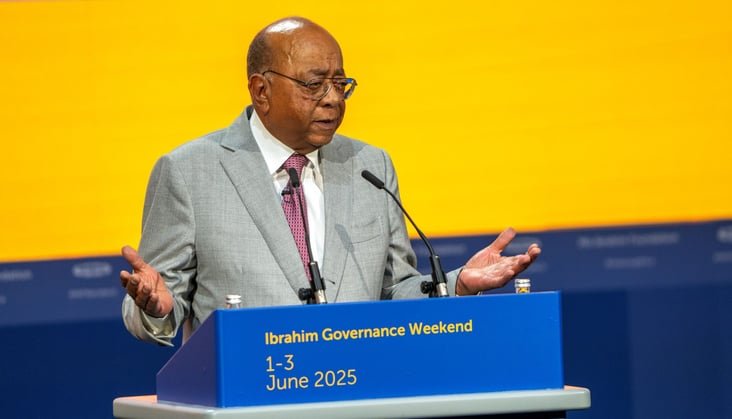Special Report – Sudan Scope
Marrakech – June 3, 2025
The 2025 edition of the Mo Ibrahim Governance Weekend concluded in Marrakech, Morocco, with high-level attendance from heads of state, UN officials, former presidents, and policymakers from across Africa and around the world. This year’s forum dedicated significant attention to the ongoing crisis in Sudan, where the civil war and catastrophic humanitarian situation became central themes in both official and informal discussions.
Warnings of "Official Silence" and Regional Complicity
In the opening session, Dr. Mo Ibrahim, founder of the forum, delivered sharp criticism of what he called the "shameful silence" of African leaders regarding the worsening humanitarian tragedy in Sudan. In his speech, he stated:
“Africa cannot remain silent in the face of the atrocities unfolding in Sudan. Leaders must take responsibility; their silence only prolongs the suffering.”
Josep Borrell: What’s Happening in Darfur is "Ethnic Cleansing"
In a notable intervention, Josep Borrell, the former EU High Representative for Foreign Affairs, described attacks carried out by the Rapid Support Forces (RSF) in West Darfur as:
“Part of an organized campaign of ethnic cleansing aimed at eliminating the non-Arab Masalit community.”
He urged the international community to acknowledge the severity of the crimes committed, stop the flow of arms to warring parties, and implement accountability mechanisms.
Abdalla Hamdok: No Military Solution to the Sudanese Crisis
Dr. Abdalla Hamdok, former Sudanese Prime Minister and current leader of the Civil Democratic Forces Coalition (SOMOOD), also participated in the forum and made key statements on the sidelines of the meetings. Hamdok warned against relying on military victory and rejected what he called the “Port Sudan Plan” proposed by army-aligned authorities in March 2025, saying:
“This is not a peace plan, but a unilateral vision from a party that believes it is winning. A peaceful solution cannot be based on imposing legitimacy without consensus.”
He added that international recognition of any authority must be the result of an inclusive political process, not military dominance.
Extensive Diplomatic Engagements by Sudanese Civilians
On the sidelines of the summit, representatives of Sudan’s civilian forces held important meetings with several high-profile international figures, including:
- Amina Mohammed, UN Deputy Secretary-General
- Moussa Faki, former Chairperson of the African Union Commission
- Deputy Leader of Angola’s ruling party and Chair of the African Union Peace and Security Council
- David Lammy, UK Foreign Secretary
These meetings focused on presenting the civilian vision for a peaceful resolution, emphasizing the need to halt arms transfers to the warring parties, support a ceasefire, and launch a comprehensive Sudanese-led political process.
Sudanese Presence Draws Attention
The forum saw a strong Sudanese presence, including a high-level delegation from the Civil Democratic Forces Coalition (SOMOUD), which gave the Sudanese file top priority in most sessions, even in those not originally dedicated to it, according to several attendees.
Sudanese participants confirmed that this presence helped refocus international attention on the forgotten war, while offering an alternative narrative to the unilateral or regionally imposed solutions.
Key Takeaways and Recommendations:
- Reaffirmation that there is no military solution to the Sudanese crisis
- A call for an immediate ceasefire and the start of inclusive negotiations
- Rejection of unilateral solutions as threats to stability
- A call for African leaders and the international community to shoulder their responsibilities
The 2025 Mo Ibrahim Governance Forum marked a pivotal political moment to bring Sudan’s crisis back onto the African and global agenda, amid growing calls to end the war and the suffering of millions of Sudanese people.

